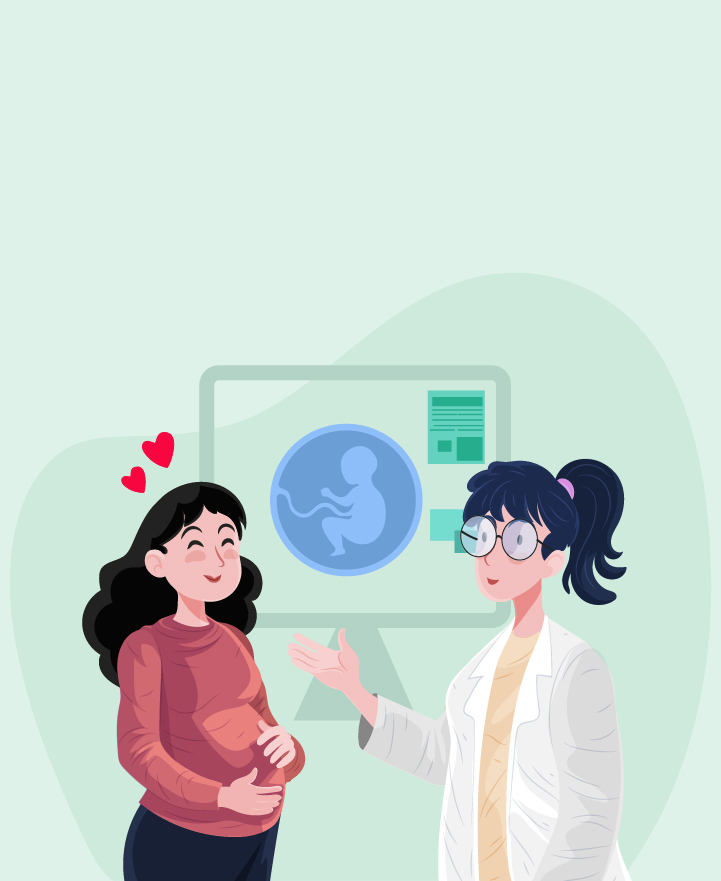

How Organs Move During Pregnancy
Have you ever wondered how your body accommodates the placenta and a completely new baby while pregnant? While organ displacement during pregnancy is made possible by your naturally elastic stomach skin, a significant portion of it is caused by your organs moving and compressing against one another as your uterus grows. This is the reason for experiencing certain pregnancy symptoms, like heartburn and indigestion. Read on to know more.
What happens to your organs when you're pregnant?
Your body changes remarkably throughout pregnancy to facilitate growth and development of the unborn child. Organ displacement during pregnancy takes place to meet the needs of the developing infant. To make room for the developing fetus, uterus grows dramatically, pushing out the bladder and intestines in the process. Hormonal fluctuations bring about changes in the kidneys and other organs, making them work harder to remove waste from your blood and the blood of your unborn child.
What happens during the 1st trimester?
During the first trimester of pregnancy, amazing transformations occur as your body prepares to nurture a new life. The embryo rapidly grows from a tiny cluster of cells into a recognisable human form along with formation of vital organs. By end of the first trimester, the risk of miscarriage decreases significantly, and many women begin to feel more energetic.
What happens during the 2nd trimester?
Your uterus will emerge from the pelvis and usually end up between your breasts and belly button. Your bladder experiences increased pressure, which could lead to more frequent urination. As the ligaments in your hips and back begin to loosen in preparation for your baby's growth and delivery, you can also experience pain or discomfort in these areas.
What happens during the 3rd trimester?
Your uterus grows to the size of a watermelon during the third trimester and reaches your rib cage. To accommodate the growing baby, your abdominal organs, such as your stomach and liver, move upward. Your heart and lungs may experience increased pressure when these organs move upward.
What happens during delivery?
After your baby is born, your uterus gradually contracts to its pre-pregnancy size, usually within six weeks. The delivery of your placenta occurs immediately after your baby is delivered. During pregnancy, the placenta forms inside the uterus to feed your unborn child with blood and food. You will give birth to your child and deliver the placenta.
When do your organs go back to their typical location after delivery?
After childbirth, it takes roughly two months to get back to normal.
Conclusion
Your body experiences organ displacement during pregnancy to make room for a growing baby. Organs expand, reposition, and compress to accommodate your growing child. Your organs will eventually revert to their pre-pregnancy sizes and placements in a few months.
One of the important components of our overall wellness is also being financially secured. Healthcare emergencies can happen any time, but a good health insurance policy can protect you from such uncertain situations. To know more about Wellness and other health related tips, visit the wellness corner.
Source: healthline.com, whattoexpect.com
Disclaimer: This blog provides general information and discussions about health and related subjects. The information and other content provided in this blog, website or in any linked materials are not intended and should not be considered, or used as a substitute for, medical advice, diagnosis or treatment. Kindly contact your Doctor before starting a new medicine or health regime.
Related Articles
Maternal Health: Important For Women’s Well-being
Pregnancy Care Tips- From Planning to Delivery
Pregnancy-Safe Workouts at Home
Published on May 03, 2024














 Health Insurance
Health Insurance  Travel Insurance
Travel Insurance  Car Insurance
Car Insurance  Cyber Insurance
Cyber Insurance  Critical Illness Insurance
Critical Illness Insurance
 Pet Insurance
Pet Insurance
 Bike/Two Wheeler Insurance
Bike/Two Wheeler Insurance  Home Insurance
Home Insurance  Third Party Vehicle Ins.
Third Party Vehicle Ins.  Tractor Insurance
Tractor Insurance  Goods Carrying Vehicle Ins.
Goods Carrying Vehicle Ins.  Passenger Carrying Vehicle Ins.
Passenger Carrying Vehicle Ins.  Compulsory Personal Accident Insurance
Compulsory Personal Accident Insurance  Travel Insurance
Travel Insurance  Rural
Rural